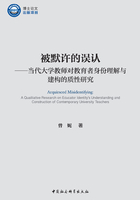
Abstract
Nowadays,with the increasingly urgent to improve the quality of higher education,university teachers’ education responsibilities have been repeatedly emphasized,but frequently doubted.With steady development of higher education massification,the mission of university education is arduous,whereas university teachers’ energies are often expended on so many places.How should we enable the achievement of university’s educational function by taking actions from university teachers? It is not only an important research topic,but also a key practical proposition.According to previous researches,researchers’ research topics focus on either comprehensive professional identity of university teachers’ academic profession,or the deserved state of their professional ethics in speculative ways.There are very few studies actually focus on university teachers’ educator identity.However,if we cannot effectively solve the prerequisite issue which is “the connotation of university teachers’ educator identity”,it will be hard to achieve substantial breakthroughs on faculty development,university teachers’ professional ethics,and so on.
Based on the above reasons,this research selects “educator identity’s understanding and construction of contemporary university teachers” as research subject.The researcher applies grounded theory and Fairclough’s critical discourse analysis theory to analyze discourse resources and discourse structures within 15 interviewees’ interview texts,hope to reveal the characteristics of contemporary university teachers’ understanding and construction of educator identity through living education field study.The purpose of this study is to accurately grasp the connotation of university teachers’ educator identity,expand research field of university teachers’ occupational identity,and provide necessary facts for relevant educational administrative departments and university administrators to make policies.
The key finding of this research is that the interviewees is not practice their educator identity by clarified orientation of professional role,but by their own cognition to freely choose its definition.This freedom of choice leads to dual misidentification.In the particular context of Chinese university,misidentification is acquiesced.
Specifically speaking,the conclusions of the study include the following three aspects:
First of all,the interviewees describe their educator identity through four aspects:content,right and duty,meaning,and nature.Among them,the teacher’s understanding of the nature of educator identity influences their understanding of other aspects.According to the two attributes of educator identity’s nature(Bringing educator identity to occupational identity;Combining education to research),the interviewees’ educator identity could be divided into six types:Separated Understanding,‘Research Supported by Education’ Understanding,Research-driven Understanding,Education-driven Understanding,‘Education Supported by Research’ Understanding,and Harmony Understanding.The first three types of teachers only take “university teacher” appellation given by institution as the legal basis of educator identity,which is a way of replacing occupational identity with organizational identity.Teachers belong to type of Education-driven Understanding and ‘Education Supported by Research’ Understanding only complete the description of university teachers’ educator identity by personal understanding of education’s general attribute,which is a way of replacing occupational identity with self-identity.
Secondly,whether or not the interviewees have misidentification of their occupational identity,they use similar discourse resources,such as market discourse,management discourse,knowledge discourse,status discourse,peer discourse and education discourse,to construct their own educator identity.Only the order of discourse constructed by different teachers differs.Some are market discourse set top,some are management discourse set top,and some are education discourse set top.On the surface,the choice of discourse resources and the construction of discourse structures seem to be determined by teachers’ personal will.Analyzing deeply,however,it appears that university teachers’ misidentification of educator identity is actually acquiesced by universities and other social situations in China.From universities’ perspective,the alternative interpretation of the connotation of occupation by university organization function,the confused orientation of the connotation of occupation by knowledge attribute of university,and thus lost in higher education offer meso-level organization environment to the misidentification of university teachers’ educator identity.From market and politics perspective,Chinese society’s “Officialdom and Market” development pattern has built a macro-level social context for university teachers’ construction of educator identity,which means strong management pattern has led education become a work;the marketization of education management has resulted in materialization of education,and the marketization of academics has rendered marginalization of education.These factors’ existence also provides a possibility for misidentification of university teachers’ educator identity.
Finally,since some teachers misidentify their educator identity,we need to reconfirm the identity.The study proposes three path of confirmation:1.The fundamental goal of occupational identity’ ethical construction is to make university teachers return to their original identity as educators;2.the purpose of organizational identity’s cultural construction is to provide organizational guarantee for university teachers to practice their original educator identity;3.the focus of self-identification’s spiritual construction is to awaken the sense of identity as authentic educators,thus providing a powerful spiritual impetus for the effective implementation of their educator identity.
Key Words:Educator Identity;Occupational Identity;Combination of education and research;Dual Misidentification;Original Identity